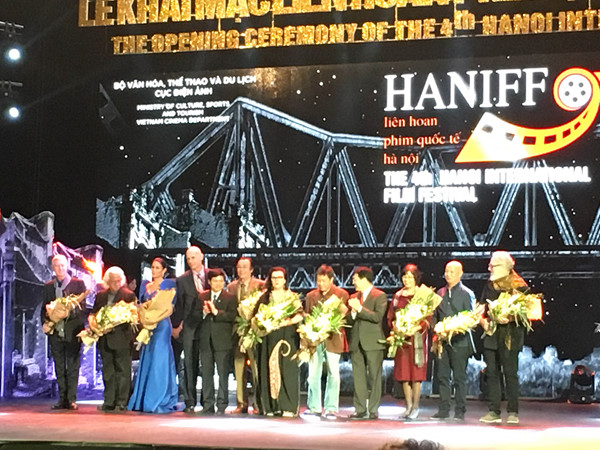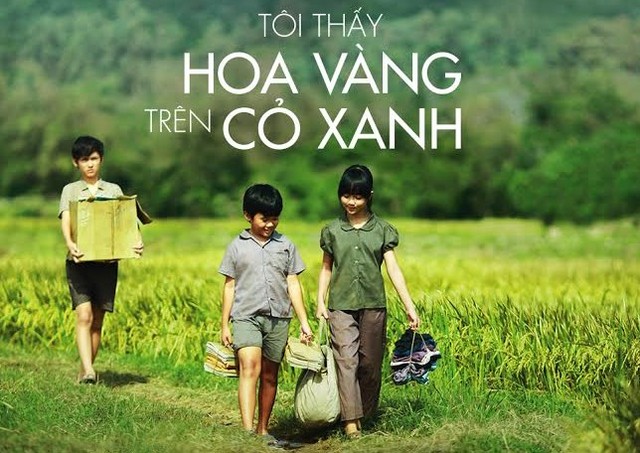
First and foremost, it is undeniable that the initiative to organize the Hanoi International Film Festival, launched eight years ago, and the regular maintenance of this extremely important event every two years, is a tremendous effort by the Vietnam Film Department in general and Vietnamese film professionals in particular. A major film industry cannot exist without international film festivals, or any similar activities. Because of its strong historical and cultural significance...socializeCinema cannot remain confined to its own niche; that is, it cannot continue to exist where filmmakers create works solely for their own benefit, or for a small domestic audience, or even to be stored away. Given the international nature and broad scope of this visual language, cinema needs to broaden its horizons, to learn and share with one another; to nurture the beauty of the human soul; to enhance awareness for those who cannot travel beyond national borders; and moreover, as an industry, cinema needs to be bought, sold, and exchanged, enriching those who work in the profession. Despite minor changes in wording, all four editions of the Film Festival have consistently adhered to the slogan "Cinema – Integration and Sustainable Development." From this perspective, will Vietnamese cinema achieve the expected results?
Cinema – Integration?
In all four editions of the film festival (2010, 2012, 2014, 2016), despite numerous issues (especially in the 2010 festival, where the MC lacked film expertise and only announced familiar domestic actors, sometimes even just "television stars," while ignoring big names like Zhang Jia Hui and Wu Yan Zu; or the MC "hijacked" the English translation, inaccurately translating the speeches of foreign film stars), putting aside these shortcomings, it can be considered a preliminary success for a young film industry. The organizers created a true film festival in the proper sense of the word. Throughout all four editions of the film festival, hundreds of films from various countries have been submitted: the first edition featured only 23 countries from the Asia-Pacific region, but starting from the second edition, and especially the fourth, when the festival expanded to include Europe and America, the number of participating films reached hundreds, with over 40 countries involved. Dozens of seminars and exchanges between audiences and filmmakers, between filmmakers themselves, and between professionals and managers, revolving around film topics (Cinema and the Audience, Developing a National Cinema, Film Collaboration Issues, Cinema in the New Development Era, etc.) have been organized. These events have given domestic filmmakers the opportunity to learn from and interact with their foreign counterparts. Through these interactions, they have also learned how their products have been received by audiences, and which films are "loved" and "hated." In particular, thanks to the Film Festival, domestic filmmakers have the opportunity to "see with their own eyes" the brilliant international talents, whom they have only heard about or seen on screen before ("hearing their voices but not seeing their faces").

Opening Ceremony of the 4th Hanoi International Film Festival
Following all four editions of the film festival, we see a large number of big names in the world of cinema. One might think that for a small, relatively unknown film industry like ours, organizing a film festival would not easily gain the support and agreement of international filmmakers. However, right from the first festival, there was participation from quite famous names (Marco Meuiller – director of the Venice Film Festival, Phillip Noyce – Hollywood film director, Hellen Harrington – director of events at the Academy of Motion Picture Arts and Sciences, along with many other names from the Toronto, Berlin, Cannes, Busan, and Bangkok Film Festivals). At the most recent festival in early November 2016, there was a whole "star cast" of French cinema including veteran director Régís Wargnier and actress Catherine Deneuve from the filmIndochina(an Oscar nominee) also attended. Not to mention the many other stars from around the world who also "descended" upon the red carpet of the Vietnam Film Festival. For a relatively small film industry, this can be considered a "miracle."
However, more importantly, in our opinion, the concept of "integration" is not simply about inviting international friends to screen their films in our country; nor is it merely about the appearance of big stars, or a few seminars and exchanges between domestic and international filmmakers and audiences. More importantly, in our view, how has Vietnamese cinema been received by international friends through these exchanges and interactions? How is the ranking of Vietnamese films determined in the discerning eyes of our international counterparts? And even more importantly, what has Vietnamese cinema learned from these film festivals? After the festivals, how many Vietnamese films have been sold internationally? Does Vietnamese cinema maintain its vibrancy after the festivals? How many more film festivals will it take before Vietnamese cinema receives the most prestigious awards?
From that perspective, it's undeniable that thanks to the Film Festival, Vietnamese cinema has achieved quite impressive progress. First, from a reception standpoint, Vietnamese audiences have become accustomed to going to the cinema to watch films, instead of mainly watching films on television or DVD screens at home as before. Audiences, especially young people, have developed a passion and understanding of the seventh art. Some have tried their hand at making their first short films. Others have begun to develop entrepreneurial awareness by attending professional film classes. For filmmakers, thanks to the Film Festival and the opportunity to interact with international filmmakers, their professionalism has gradually improved; the filmmaking atmosphere in the country has become more vibrant; and film collaborations between Vietnam and international partners have begun to appear. Independent filmmakers have also become more prevalent. There have been film projects for young filmmakers. In particular, thanks to the film festival, a very encouraging cinematic activity has recently emerged. That is the event...Autumn EncounterEvery year, a meeting between young Vietnamese filmmakers and prestigious international film stars takes place in Da Nang (thanks to the efforts of young director Phan Dang Di). Let's listen to some of the thoughts of Moon So-ri, a South Korean female director whose film "Oasis" recently won the Marcello Award: “When I heard about the Autumn Meeting program, I was very interested, especially this year, because it included an acting class. I asked Phan Dang Di about sending two of my students to this project. In Asia, South Korean, Japanese, and Chinese cinema are the three most powerful film industries, but in my opinion, none of these three can develop further. I think Korean, Japanese, and Chinese filmmakers have now lost their creative energy or new styles. They have become more commercialized. When I go to international film festivals, I meet many people, including curators, and I often ask them: “Where in Asia will there be a film industry boom in this era?” At the recent Cannes Film Festival, as well as several previous international events, many curators told me that "it's hard to predict, but it will be Vietnamese cinema." They also said that Vietnamese filmmakers participating internationally are very energetic, have their own unique style, and that makes me very curious and want to learn about the film industry in Vietnam. Attending this autumn meeting is a good opportunity for me" (according to TN newspaper, 2016).
 .
.
Filmmaker Tran Anh Hung's Directing class at the Autumn Meeting event.
Cinema - Sustainable Development?
Regarding the second criterion:Cinema – Sustainable DevelopmentLooking at all four editions of the film festival, initially, if you only consider the numbers and events, it could be considered relatively stable. Indeed, from the first to the fourth festival, over four editions and eight years, the scale and professionalism of the organizers have clearly improved. I still remember that at the first festival, even just considering the organization (the presenters, the English translation), there were issues. By the fourth festival (November 2016), the organization could be considered relatively professional. The biggest concern remains the professional aspect. Eight years ago, at the first festival, due to the difficulties in domestic film production, the number of Vietnamese films participating was not large and not diverse (around 10 films). At the second festival, the filmHot sandThe film by veteran director Le Hoang, chosen for the opening night, caused many viewers to leave midway through (their impression of Vietnamese films was very negative); at the 3rd Film Festival, it seems even the quality of the films selected to participate was problematic. Due to insufficient preparation, the quality of the films participating in the competition was uneven, with some films being "very bad" (Indonesian films). Those involved openly revealed this "bitter" truth: "There are films I don't understand why they were selected to compete" (Hong Anh); "Why were so many good films overlooked?", "Why weren't so many good films selected to compete?" (Bui Thac Chuyen). The chairman of the Short Film Council, Le Lam - a member from the French film industry - commented frankly: "Vietnamese films are weak in both technique and content. Meanwhile, there are foreign films, even though they are very short, that after watching them, we see the soul of the people and the country, we see their entire culture and nation." (TT & VH 29/11/2014). Another South Korean filmmaker offered some quite sincere opinions: “Vietnamese cinema mainly produces commercial films. But you should also consider whether, in the long run, audiences will still want to watch comedies with the same few actors repeatedly. I think before aiming for greater heights, Vietnamese cinema should develop within the domestic market, relying on its own strengths. It needs to venture out, find something different, in order to go further. Of course, it also takes time; it can't become a regional film industry overnight.” (Kini Kim, Vice President of CJ E&M Entertainment and Media Group, South Korea (TTVH Weekend, November 25, 2014). Too commercially oriented, while failing to reach an "artistic" level, after each film festival, Vietnamese cinema has only created a "buzz," meaning the number of domestically produced films has steadily increased (at the time of the first film festival, Vietnam produced an average of around 10 films annually, but by the fourth festival in November 2016, that number had risen to over 40 films (most recently, around 50 films). In terms of quantity, that's impressive. But a film that truly resonates with the audience and fully reflects Vietnamese identity remains a distant dream. This is further confirmed by the fact that in all four film festivals held on "home turf," Vietnamese cinema has never received a single real award.)honor(Here, we only consider feature films, which are considered the most important category at a film festival). Specifically, at the first Film Festival, in this category, Vietnam only received the award for Best Actress, which went to Nhat Kim Anh (in the film).Long Thanh Lute Player's Song), there were no awards for films; in the 2nd, 3rd, and 4th editions of the Film Festival, the awards received by Vietnamese films were still only Special Awards from the Jury ("special" here can also be considered an "honorary" award for the host country):The Hero's Destiny(Vichtor Vu, Part 2)Flapping wings in mid-air(Nguyen Hoang Diep, Part 3)I see yellow flowers on green grassBy Victor Vũ, Part 4. From Film Festival 1 to Film Festival 4, the number of awards won by Vietnamese cinema has increased. In addition to the official awards for short films and documentaries, at Film Festival 4, thanks to the initiative of the organizing committee, Vietnam had the honor of receiving two more awards for feature films:Winning the lotteryby Dustin Nguyen (for the category)The film was voted for by the audience.) andTaxi, What's Your Name? by Duc Thinh, Dinh Tuan Vu (for the category) The most popular film among viewers.). The jury's special prize is awarded toI see yellow flowers on green grassThe film by the talented young director Victor Vũ, who received thorough training in Hollywood (part 4), had generated some excitement and expectation among Vietnamese viewers. However, its elimination in the preliminary round of the Best Foreign Language Film category at the 2016 Academy Awards effectively extinguished that glimmer of hope. So, even one of the best films in Vietnamese cinema to date only reached the level of "beautiful," and "good" is questionable. Meanwhile, within Southeast Asia, Thailand has won the Palme d'Or; the Philippines has received Palme d'Or nominations; and Cambodia has had more than one Oscar nomination for Best Foreign Language Film. Further afield, Iran has won an Oscar and received numerous Oscar nominations. This inevitably prompts reflection among Vietnamese film enthusiasts…

Having participated in four international film festivals and for eight years proudly proclaiming "Integration and Sustainable Development," Vietnamese cinema still lacks an official award for its most important category (feature film), even on home soil. Meanwhile, during the same period, young independent filmmakers (such as Phan Đăng Di and Nguyễn Hoàng Điệp) have received awards (though not necessarily the highest) from regional and international film festivals. So what is Vietnamese cinema lacking: talent, funding, or the right mechanisms? How many more years and several more Hanoi International Film Festivals will it take before Vietnamese cinema receives an official, prestigious award for its feature films? This is a question not only filmmakers but also policymakers should ask.
Author:Tran Hinh
Newer news
Older news